Gauss's Theorem and Its Applications
Gauss's Theorem and Its Applications: Overview
This Topic covers sub-topics such as Gauss Theorem in Electrostatics, Electric Field due to a Long Charged Cylinder Using Gauss's Law, Gaussian Surfaces for Various Charge Distribution and, Electric Field due to a Long Line Charge Using Gauss's Law
Important Questions on Gauss's Theorem and Its Applications
Which law is used to derive the expression for the electric field between two uniformly charged large parallel sheets with surface charge densities and respectively:
Applying Gauss theorem, the expression for the electric field intensity at a point due to an infinitely long, thin, uniformly charged straight wire is
A hollow charged metal sphere has radius . If the potential difference between its surface and a point at a distance from the centre is, then electric field intensity at a distance is:
When the charge on a capacitor increases keeping geometry the same
An electron is fired directly towards a large metal plate having surface charge density . The distance from where the electron be projected so that it just fails to strike the plate is
In the figure shown, there is a large sheet of charge of uniform surface charge density . A charge particle of charge and mass is projected from a point on the sheet with a speed with angle of projection such that it lands at maximum distance from on the sheet. Neglecting gravity, find the time of flight.
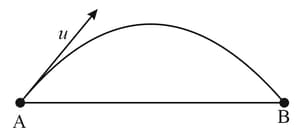
The total flux through the faces of the cube with side of length if a charge is placed at corner of the cube is
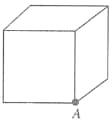
A point charge of is at the centre of cubical Gaussian surface on edge. What is the net electric flux through the surface?
A ring of radius having a linear charge density moves towards a solid imaginary sphere of radius so that the centre of ring passes through the centre of the sphere. The axis of the ring is perpendicular to the line joining the centres of the ring and the sphere. The maximum flux through the sphere in this process is
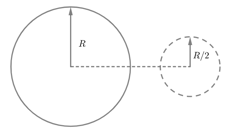
A conducting spherical shell of radius has a charge units. The electric field due to the shell at a point
Flux coming out from a unit positive charge enclosed in air is
A Gaussian sphere encloses an electric dipole within it. The total flux across the sphere is
and are point charges located at points, as shown in the figure, and is a spherical Gaussian surface of radius . Which of the following is true, according to the Gauss' law?
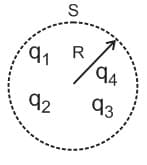
The figure shows a closed surface which intersects a conducting sphere. If a positive charge is placed at the point , the flux of the electric field through the closed surface,
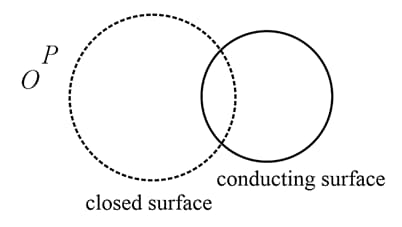
A Gaussian sphere encloses an electric dipole within it. The total flux through the sphere is
Flux coming out from a unit positive charge enclosed in air is
A conducting spherical shell of radius has a charge units. The electric field due to the shell at a point
A hollow cylinder has a charge at the middle point of it. If is the electric flux in units of volt metre associated with the curved surface , the flux linked with the plane surface in a unit of volt metre will be

The potential due to an electrostatic charge distribution is where is positive. The net charge within a sphere centred at the origin and of radius is
The electric field intensity outside the charged conducting sphere of radius , placed in a medium of permittivity at a distance from the centre of the sphere in terms of surface charge density is
